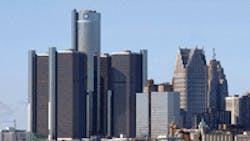Chances are pretty good that any study that suggests Detroit is a hotspot for new jobs and economic activity will have been prepared by the city itself. And such is the case with a recent report, written by the Detroit Regional Chamber of Commerce and Michigan State University, which projects that Detroit could gain as many as 66,000 new jobs over the next decade, while adding $10 billion to the local economy, by transforming itself into a supply chain hub.
That would represent an impressive transformation; in June 2010, metropolitan Detroit had the highest jobless rate in the nation (14.3%), according to the U.S. Bureau of Labor Statistics. That transformation would begin by focusing on light and heavy manufacturing and distribution centers, says David Closs, a professor of supply chain management at Michigan State University and co-author of the study. "However, to achieve the job growth and increased economic activity the region must refine some economic and regulatory policies and enhance communications regarding the unique capabilities the region offers each of the strategic elements," he notes.
The study compares metro Detroit with other established supply chain hubs. Some hubs, such as Memphis and Louisville, earned their status largely due to the presence of major logistics providers (FedEx and UPS, respectively). Others, such as Chicago and Kansas City, are traditionally known as intermodal areas, thanks in large part to their proximity to rail and interstate highway networks.
Becoming a supply chain hub, whether it's Detroit or any other city, requires three basic activities, according to the study:
• building differentiated hubs, which can attract industry activity to stimulate economic growth and job creation;
• attracting industries to the supply chain hub to build economies of scale; and
• facilitating hub development through private/public-sector partnerships.
"Supply chain hubs begin as high-activity transportation centers where freight is brought in from domestic and international locations and shifted from one transportation mode to another, e.g., water to rail, rail to truck, air to truck, to complete efficient delivery to manufacturers, retailers and consumers," Closs explains. "As the hubs develop, activities such as warehousing, inventory management and light manufacturing begin to occur as a result of the convenience of locating near major freight hubs. Eventually, management expertise is necessary to guide, integrate and synchronize these activities across firms, region and globe."
Why would a manufacturer choose to move their goods through Detroit, then, and not one of the existing supply chain hubs? According to Closs, Detroit's advantages include less congestion for cross-border distribution than nearby Chicago or Toronto; relatively inexpensive outbound trucking capacity; availability of land and facilities; a competitive tax climate; economic competitiveness and lowest total cost to serve; and supply chain sustainability.
See Also:
• The 3PL Market Slump is Over
• The New Supply Chain Agenda
About the Author
Dave Blanchard
Senior Director of Content
Focus: Supply Chain
Call: (941) 208-4370
Follow on Twitter @SupplyChainDave
During his career Dave Blanchard has led the editorial management of many of Endeavor Business Media's best-known brands, including IndustryWeek, EHS Today, Material Handling & Logistics, Logistics Today, Supply Chain Technology News, and Business Finance. He also serves as senior content director of the annual Safety Leadership Conference. With over 30 years of B2B media experience, Dave literally wrote the book on supply chain management, Supply Chain Management Best Practices (John Wiley & Sons, 2010), which has been translated into several languages and is currently in its second edition. He is a frequent speaker and moderator at major trade shows and conferences, and has won numerous awards for writing and editing. He is a voting member of the jury of the Logistics Hall of Fame, and is a graduate of Northern Illinois University.
